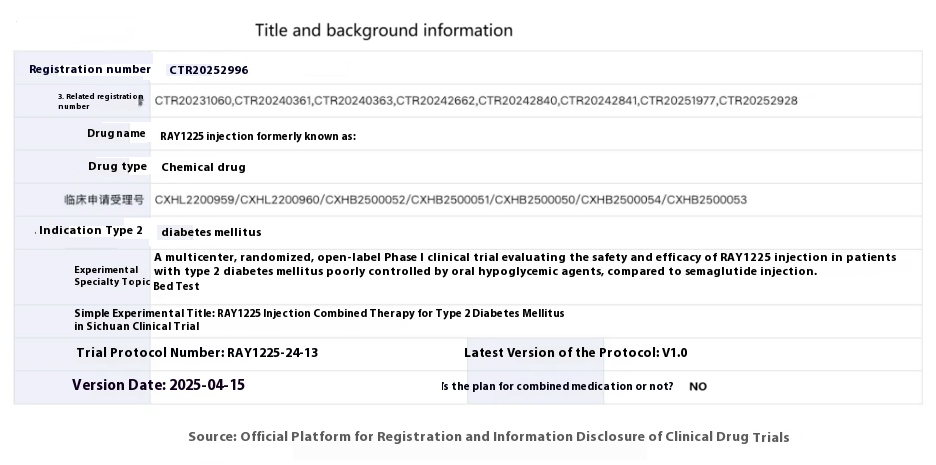-
-
GLP-1 Side Chains
 显示更多
显示更多 -
Peptide Intermediates

-
Fmoc-His-Aib-OH
-
Fmoc-Ile-Aib-OH
-
Fmoc-Tyr(tBu)-Aib-OH
-
Fmoc-Glu(OtBu)-Aib-OH
-
Fmoc-His(Fmoc)-Aib-OH
-
Fmoc-His(Fmoc)-Aib-OSu
显示更多 -
-
Tirzepatide Fragments

-
CAS:2682040-93-1
-
CAS:3034670-52-2
-
CAS:1262308-37-1
-
CAS:2461524-68-3
-
CAS:2656383-24-1
-
CAS:2656383-25-2
显示更多 -
-
API & Excipients
 显示更多
显示更多 -
Cosmetic Peptides
-
Oligopeptide-1
-
NonaPeptide-1
-
Copper Tripeptide-1
-
Acetyl Hexapeptide-8
-
Palmitoyl Tripeptide-1
-
Decarboxy Carnosine HCl
显示更多 -
-
Active Ingredients
 显示更多
显示更多
-
Raynovent Initiates Phase III Trials for GLP-1R/GIPR Dual Agonist, Challenging Semaglutide
Publish Time:
2025-08-08
On July 30, the official website of the Drug Clinical Trial Registration and Information Disclosure Platform showed that Raynovent Biotech's subsidiary, Raynovent registered a Phase III clinical trial of RAY1225 injection in combination therapy for type 2 diabetes (RAY1225-24-13, Registration No.: CTR20252996) 。

This is a multi-center, randomized, open-label, semaglutide injection-controlled Phase III clinical trial designed to evaluate the safety and efficacy of RAY1225 in patients with type 2 diabetes whose blood glucose is poorly controlled after oral hypoglycemic drugs.
The study plans to enroll 600 subjects , randomly assigned to receive RAY1225 subcutaneous injection every two weeks and Semaglutide subcutaneous injection once a week treatment for 52 weeks. The primary endpoint is the change in HbA1c from baseline at 36 weeks of treatment, and the secondary endpoints include the change in HbA1c from baseline at each time point, the change in HbA1c from baseline at each time point, adverse events, laboratory tests, vital signs, electrocardiogram, and hypoglycemic events.
RAY1225 is an independently developed by ZS Raynovent GLP-1/GIP dual receptor agonist . RAY1225 regulates human metabolism through multiple mechanisms of action such as promoting insulin secretion in a glucose-dependent manner and delaying gastric emptying, thereby achieving the effects of lowering blood sugar, reducing weight, and reducing peripheral insulin resistance. and is expected to be used for the treatment of various metabolic diseases such as lowering blood sugar, weight loss, and metabolic syndrome.
In June of this year, ZS Raynovent will announce the latest results of the Phase II REBUILDING-1 study of RAY1225 in the treatment of overweight/obesity at the American Diabetes Association in the form of a poster.
The study included Part A lower-dose parallel study and Part B higher-dose dose escalation and expansion study, and a total of 132 subjects were included. At baseline, the average weight of the subjects was 91.07 kg, and the average BMI was 32.33 kg/m2。 The primary endpoint was at week 24 Percentage change in body weight from baseline.
The results showed that at week 24, the percentage of average weight change in the RAY1225 group was: 10.05% decrease in the 3mg group, 12.98% decrease in the 6mg group, 15.05% decrease in the 9mg group, and 3.55% decrease in the placebo group (P<0.001) Approximately 73.2% to 95.1% of subjects in the RAY1225 group experienced a weight loss of ≥5%, while only 30.0% in the placebo group (P<0.05) 。
In addition, RAY1225 is also beneficial for improving cardiometabolic indicators. The most common adverse events (AEs) of RAY1225 were gastrointestinal reactions, most of which were mild to moderate and mainly occurred during dose escalation. No drug-related serious adverse events occurred.
Insight database shows that in addition to Raynovent, Innovent Biologics (Mazdutide), Gan & Lee Pharmaceuticals (Glepaglutide), Hengrui Pharmaceuticals (HRS9531) and Borui Biologics (BGM0504) have also launched Phase III clinical trials to challenge semaglutide.
CongenPharma provides products for the entire drug peptide industry chain, welcome to contact us!
Prev:
Relevant Information
undefined
COOKIES
Our website uses cookies and similar technologies to personalize the advertising shown to you and to help you get the best experience on our website. For more information, see our Privacy & Cookie Policy
COOKIES
Our website uses cookies and similar technologies to personalize the advertising shown to you and to help you get the best experience on our website. For more information, see our Privacy & Cookie Policy
These cookies are necessary for basic functions such as payment. Standard cookies cannot be turned off and do not store any of your information.
These cookies collect information, such as how many people are using our site or which pages are popular, to help us improve the customer experience. Turning these cookies off will mean we can't collect information to improve your experience.
These cookies enable the website to provide enhanced functionality and personalization. They may be set by us or by third-party providers whose services we have added to our pages. If you do not allow these cookies, some or all of these services may not function properly.
These cookies help us understand what you are interested in so that we can show you relevant advertising on other websites. Turning these cookies off will mean we are unable to show you any personalized advertising.
Sorry,当前栏目暂无内容!
您可以查看其他栏目或返回 首页
Sorry,The current column has no content!
You can view other columns or return Home




